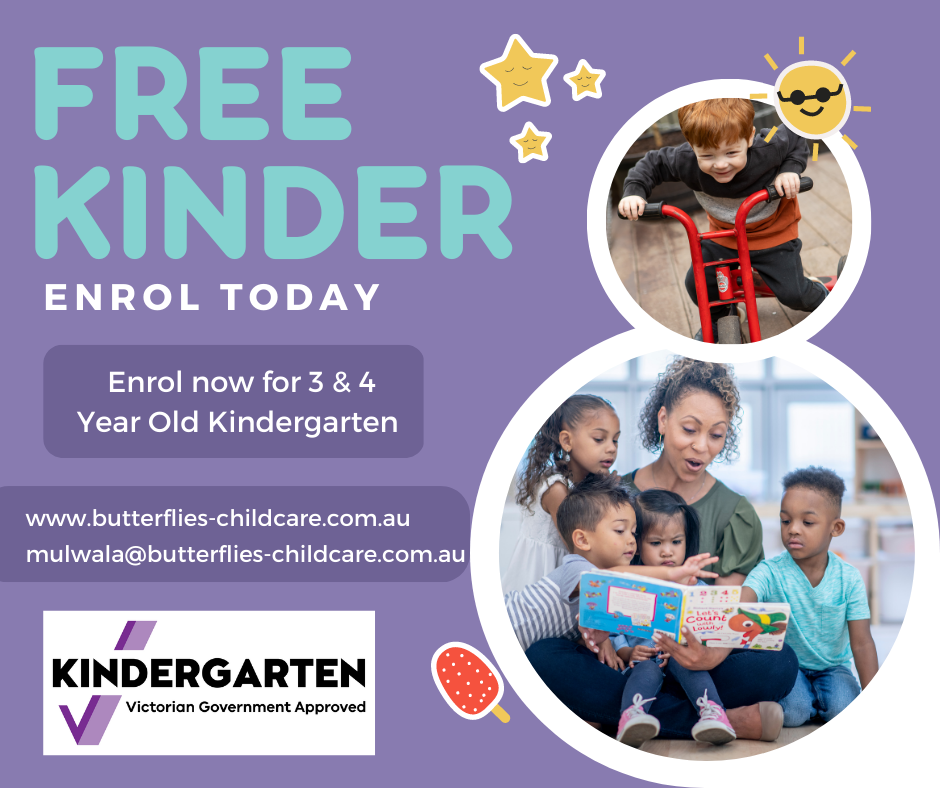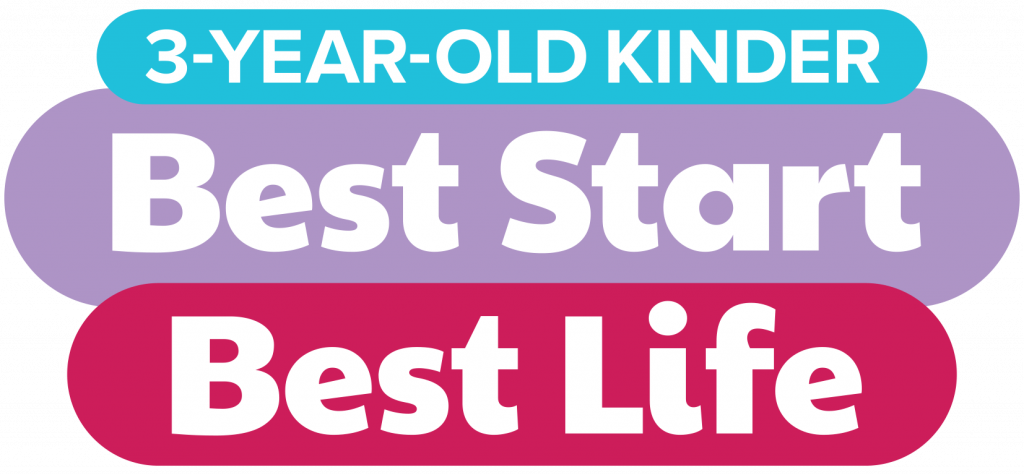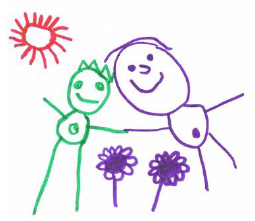

Butterflies Childcare & Early Learning Centre currently offers a Government Funded 3 Year Old Kindergarten Program as well as a Government Funded 4 Year Old Kindergarten Program.
Children must be at least 3 years old by 30th April in the year they attend 3 Year Old Kinder.
Over the decade, the Victorian Government is investing almost $5 billion to introduce funded Three-Year-Old Kindergarten – and your child can access this right here at Butterflies Childcare & Early Learning Centre – with access to 15 HOURS FREE KINDER!!
This will mean another year of learning, playing and making friends for all Victorian children.
The 3 Year Old Kindergarten Program is delivered in our Caterpillars & Dragonflies Rooms between normal operating hours and there are no session times, meaning more flexibility for families and children.
If you child is currently enrolled at Butterflies, they will have a guaranteed position in our 3 & 4 Year old Kindergarten in the year they are due.
The 3 Year Old Kindergarten children participate in several incursions throughout the year with no additional cost.
Our 3 Year Old Kindergarten programs are designed to improve your child’s development in the following key areas:
- social skills, like how to play with other children in a calm, sharing and rewarding way
- self-awareness and respect for others
- emotional skills, for example understanding their feelings
- language, literacy and numeracy skills, such as reading stories and counting objects
- a joy for learning and group activities, such as talking, drawing and making things together with other children their own age
- ability to make new friends
- exposure to new ideas and concepts.
3 Year Old Kindergarten also provides families with access to:
- support and assistance for children with special needs
- resources and links to community support services.
The 3 Year Old program runs from Monday to Friday, between the hours of 6.30am – 6.30pm (at Mulwala Drive) and 6.30am – 6.00pm (at Orchard Road). Our Three Year Old program is heavily play based, as this is how children of this developmental stage learn.
The benefits of Learning through play
Educators draw on their values, professional knowledge and skills as they pay close attention to the interrelated pedagogical practices outlined in the Early Years Learning Framework:
- holistic approaches
- responsiveness to children
- learning through play
- learning environments
- intentional teaching
- cultural competence
- continuity of learning and transitions
- assessment for learning
Planning and teaching for learning through play has long been considered a key feature of early childhood education—a feature which distinguishes it from other sectors of education and is deeply grounded in our history. The EYLF has a specific emphasis on play-based learning and teaching. It acknowledges that children have a right to play under the principles of the United Nations Convention on the Rights of the Child (UNICEF, 1989).

Cognitive and creativity outcomes
Play is associated with the development of intellectual skills and understandings. In play experiences children integrate emotions, thinking and motivation that establish neural connections critical to effective brain functioning (Lester & Russell, 2008). When children play they use imagination and imitation which requires complex cognitive or intellectual processes. The development of cognitive skills, including dispositions for learning (such as curiosity and persistence), memory and thinking skills, and language and literacy skills, have strong links to play (Bodrova & Leong, 2005) (links with Learning Outcomes 3, 4 and 5).
Social and emotional outcomes
Play is associated with the development of social and emotional skills and understandings. Research shows that play assists children in building social skills that support positive relationships. Playing also helps to teach children how to regulate their behaviour, and understand others’ feelings, as well as promoting a sense of independence.
Wellbeing outcomes
Play is associated with increased feelings of wellbeing which lead to good mental health outcomes. The pleasure and satisfaction associated with play and the freedom from pressure to perform in play supports the development of a strong sense of wellbeing (Gordon, O’Toole & hitman, 2008) (links with Learning Outcomes 1, 2 and 3).
Physical outcomes

Play is associated with physical health. Physically active play is related to the development of physical skills and the increased health benefits of improved metabolism and energy expenditure (Lester & Russell, 2008; Frost, Wortham & Reifel, 2006) (links with Learning Outcomes 1 and 3).
Children will be involved in stimulating activities, both planned and spontaneous. Children will be involved in activities and experiences including sensory experiences. Children will explore these experiences using water, clay, dirt, play dough, etc.
Play experiences include: social play areas, dramatic and imaginative play areas, whole and small group activities and quiet play areas. Educators will ensure physical development areas are available and children are encouraged to participate. Educators will also focus on fine motor skills through activities such as cutting, painting, pasting and constructing.
The 3 Year Old Kindergarten sessions will commence with children involved in free play, either indoor and/or outdoor, followed by structured activities and experiences throughout the day. Educators will hold group times before meals to bring the group together. This may involve a story, singing, dancing or a group discussion. Please see below for a full outline of the flexible daily routine.

3 Year Old Kindergarten Flexible Daily Routine
6.30am -7.30am – Children are involved in Family Grouping activities in the Ladybugs room.
7.30am – Educator brings the group down to the 3 year old room. Children are involved in free exploration of activities.
9.00am – Group time held before morning tea 9.00am – 9.30am – Morning Tea
10.00am -11.30am – Children are involved in a balance of structured activities and learning through play. Children have the opportunity to make choices about their learning and become confident and involved learners.
11.35am – Group time – Children come together to join in a story, game or activity. This helps children settle and creates a smoother transition into lunch time.
11.45pm -12.30pm – Lunch Time. Children serve their own lunch and have the opportunity to interact in a meal time with their peers.
12.30pm-1.30pm – Rest Time. Children are given the opportunity for a rest or sleep. This allows children to absorb the information form the mornings activities and experiences and be refreshed for the afternoon program.
1.30pm – 2.30pm – Children are involved in a balance of structured activities and learning through play. Children have the opportunity to make choices about their learning and become confident and involved learners.
2.30pm – 3.00pm – Afternoon Tea. Children have the opportunity to interact in a meal time with their peers.
3.15pm – Group time – Children come together to join in a story, game or activity. They will also be involved in a discussion about the days topic of interest and activities and experiences.
3.30pm – 6.00pm – Children are involved in free exploration of activities of their choice, both indoor and outdoor. Our Orchard Road centre closes at 6.00pm.
At our Mulwala Drive centre, children will be involved in free exploration of activities of their choice until the centre closure at 6.30pm.
3 Year Old Kindergarten Program

The Caterpillars & Dragonflies’ programs are on display and accessible via your FREE Storypark account. Our educators plan for the room one week in advance, adding in spontaneous activities throughout the day. We welcome and encourage parents and family members to add to this program and let educators know of special interests of their child.
